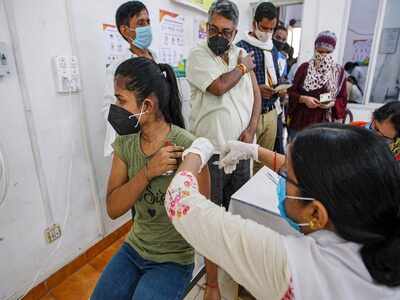Top Searches
- News
- India News
- Ask the expert: 'With precautions, vaccines safe for people with heart, blood disorders'
Ask the expert: 'With precautions, vaccines safe for people with heart, blood disorders'

Is it advisable to continue taking vitamin C & zinc tablets even after full recovery from Covid-19?
—CV PURUSHOTHAMAN, AHMEDABAD
No medicine should be taken long-term without consulting a doctor, not even vitamins. After recovery from Covid, a proper lifestyle and good food are most important, not vitamins. There are theories now that too much zinc could be one of the reasons for mucormycosis. So, there could be side effects even to vitamins if taken without supervision.
What does high ‘ab iGg’ refer to in an antibody test? Is a person with high ab iGg eligible for vaccination? Is RT-PCR needed?
—AKSHAY KUMAR, BENGALURU
By high ‘ab IGg’, I guess you are referring to high antibodies. Even if you have high antibodies you must get yourself vaccinated. However, if you have acute symptoms of Covid, such as high fever, cough, etc, don’t take a vaccine at that time. You can get an RT-PCR test to see if you have Covid. RT-PCR tests are not routinely required before vaccination.
I am waiting for my second dose of Covishield. Can I take Sputnik V instead?
—MAHESH, KOCHI
Till now, combinations of vaccines have not been approved. There are studies going on to see if it is safe to combine vaccines. But the results of these studies are not out yet. As of today, you should not take a different vaccine – stick to the same vaccine for the second shot too.
What should be the normal range of CBC during Covid? Is a CRP test necessary for Covid?
—UMESH CHOKSHI, CHENNAI
There is nothing like a normal CBC (complete blood count) during Covid. CBC gets affected during any infection. CRP is done as a marker of inflammation. It is up to the treating doctor to prescribe appropriate tests at the appropriate time and give medication. It is not a mandatory test to be done on your own.
My father has polycythemia vera2 as well as hyperthyroidism, for which he is taking medication. Can he get vaccinated?
—PRANOY JEEVAN, BENGALURU
Polycythemia vera is a myeloproliferative disorder characterised by an increase in our blood cells (myeloid cells). Patients most commonly present with high haemoglobin or red cell count. They are at a higher risk for blood clots, and when other blood parameters increase they can also be at risk for bleeding.
Mostly, patients with polycythemia vera are treated with a small dose of aspirin to prevent blood clotting. At present, we don’t have large-scale data for Covid vaccine safety in all haematologic conditions. However, most guidelines allow patients with polycythemia vera to receive the vaccine. Patients with polycythemia vera are at an increased risk of thrombosis and bleeding during a Covid infection. Hence, it would be beneficial to take the Covid vaccine. There are no restrictions for thyroid disorders and Covid vaccination. Please have your father see his haematologist for an evaluation before taking the vaccine.
Are Covid vaccines safe for people with dilated cardiomyopathy (DCM)?
—RAJIT D, AHMEDABAD
Yes, it is safe to take a vaccine. Heart patients are at a higher risk of complications from Covid-19 infection and the vaccine will reduce the chances of serious illnesses requiring hospitalisation. However, in case you are taking a blood thinner, please read my answer on blood thinners.
I am a 68-year-old woman, diabetic and a BP patient. I am also taking blood thinners. Two months back, I was diagnosed with herpes with severe pain in my left arm and now in the little finger with numbness. I have been on medication for it for the past two months. Can I take the vaccine?
—PRAGYA SHARMA, MUMBAI
Patients on blood thinners can take the vaccine with certain precautions. There are two types of blood thinners, antiplatelet and oral anticoagulants.
Those on antiplatelets such as aspirin, clopidogrel, ticagrelor, prasugrel, etc can take the vaccine with a fine needle (23 or 25 gauge) and apply firm pressure (without rubbing) to the site for at least two minutes.
Those on oral anticoagulants, such as warfarin or acitrom, must consult their doctor. They need to undergo a blood test called INR and can take the vaccine as long as their INR is below the upper level of the therapeutic range, taking precautions as mentioned for antiplatelets.
Answers by Dr S Chatterjee, senior consultant, Internal medicine at Indraprastha Apollo Hospital, Delhi, Dr Ian Pinto, Blood specialist, Breach Candy hospital and Dr Ramakanta Panda, cardiovascular thoracic surgeon, VC & MD of Asian Heart Institute, Mumbai
FacebookTwitterLinkedinEMail
Start a Conversation
end of article
Quick Links
Coronavirus in MumbaiFarm bill 2020Farmers protestCoronavirus in DelhiCoronavirus in BangaloreCoronavirus symptomsCoronavirus in IndiaWest Bengal elections 2021Coronavirus NewsSolar EclipseNPRWhat is NRCCAB BillCAB and NRCAssam election 2021Podcast newsLok SabhaTamil Nadu Election 2021CongressBJP newsKerala Elections 2021Indian ArmyISRO newsSupreme Court
